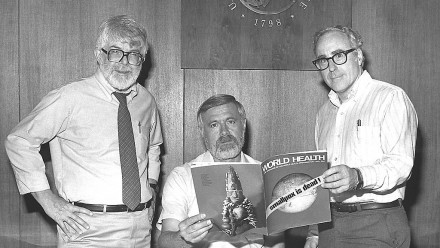Remembering Dr Michael Lane
Share
Epidemiologist who helped conquer smallpox, and educate the next generation of ‘disease detectives’
Dr Michael Lane is most remembered as one of the leaders in the successful battle against smallpox – a disease that killed hundreds of millions worldwide, and often left survivors with horrific scars or blind. He hunted the virus around the world, educating and vaccinating communities until its eventual eradication in 1980.
What many might not know, however, is that Lane was also an enormously talented teacher. He was deeply committed to educating the next generation of field epidemiologists, and accepted a secondment from the United States Centers for Disease Control and Prevention (CDC) from 1991-93 to help establish the Master of Applied Epidemiology (MAE) program at the Australian National University.
“The program was ground breaking, as it placed the leadership of a field epidemiology training in a University setting,” says Professor Martyn Kirk, MAE Alumnus and previous Director of the program.
“Lane was highly influential in all aspects of the program design and conduct, including recruiting new scholars, setting the curriculum, bringing US CDC and Australian experts to give introductory lectures to the course. Mike ensured that the program closely followed the US Epidemic Intelligence Service model, and that MAE scholars were embedded in the day-to-day work of health departments,” says Kirk.
Image: Lane (centre left) and students from the first two MAE cohorts.
Professor Bob Douglas, Foundation Director of the National Centre for Epidemiology and Population Health (NCEPH), ANU, played a huge role in the recruitment of Lane. He remembers Lane as a marvellous choice, deeply committed, charismatic and enormously talented as a teacher and as an applied epidemiologist.
Douglas muses that in the early days of the MAE, Lane would wander the corridors saying ‘we need a major national epidemic to put the program on the front pages of newspapers across the nation’. And it wasn’t long before he got his wish. In September 1991 MAE scholars were the key workforce in a large coordinated investigation across Australia into a large outbreak of norovirus contaminated orange juice served on commercial airlines, estimated to have effected 25,000 people.
Lane is also remembered by his students for his many amusing phrases.
“This led the early cohorts of MAE scholars to produce what was called ‘Lane’s Laws’ that stated things like: ‘control yourself when choosing controls’, ‘remember outbreaks are fun’, and ‘data are plural’,” says Kirk.

Among the first cohorts to graduate was Raina MacIntyre, now a Professor of Global Biosecurity, and Head of the Biosecurity Research Program at the Kirby Institute, UNSW Medicine.
“I first met Mike in 1992 as a student of field epidemiology at the Australian National University. He instilled in me a love of infectious diseases field epidemiology, the "disease detective" work which is one of the most important contributions of the United States to global public health,” says MacIntyre.
Lane has left an enormous legacy in Australia and at the Australian National University, which has since graduated over 200 field epidemiologists. The foundation that Lane set, making sure that scholars investigate outbreaks rapidly and work within health departments and national centres, is more relevant today than ever before. Like its American counterpart, the MAE has become a living, breathing national network of expertise.
Today, graduates of the MAE program have been at the forefront of the COVID-19 response in Australia and globally, from contact tracing, producing research rapid reviews, working directly with communities and health care professionals, to advising health authorities on their COVID-19 policy responses.
“Mike would be proud of the different pieces of work that MAE alumni, staff and students have taken on to respond to COVID-19,” says Kirk.
More memories of Dr Michael Lane
“We knew from Day One that Mike was an exceptional teacher and brilliant field epidemiologist. However, it wasn’t until some years later on my first trip to US CDC that I realised just how fortunate we’d been. I was telling a group of CDC colleagues about the MAE and mentioned that Mike was my supervisor. They were as a group disbelieving and incredulous; one suggested I was mistaken, or that I must be referring to a different Mike Lane, not the Mike Lane. He was truly legendary among the public health pantheon.”
Dr Tony Stewart. Tony Stewart was one of the initial cohort in 1991, many of whom went on to careers in international public health. Stewart was chair of WHO’s Global Outbreak Alert and Response Network during the West Africa Ebola outbreak and later worked with WHO’s Health Emergencies Program.
*** Alumni of the early MAE program recently enjoyed remembering “Lane’s Laws”. You can download a copy here.
Listen to an interview between Dr Michael Lane and Professor Raina MacIntyre: Smallpox lessons from the field.
You can learn more about the history of the MAE and the National Centre for Epidemiology and Population Health (NCEPH) by Professor Bob Douglas’, Foundation Director of NCEPH.
Find out more about MAE program.
By Liz Drummond.











